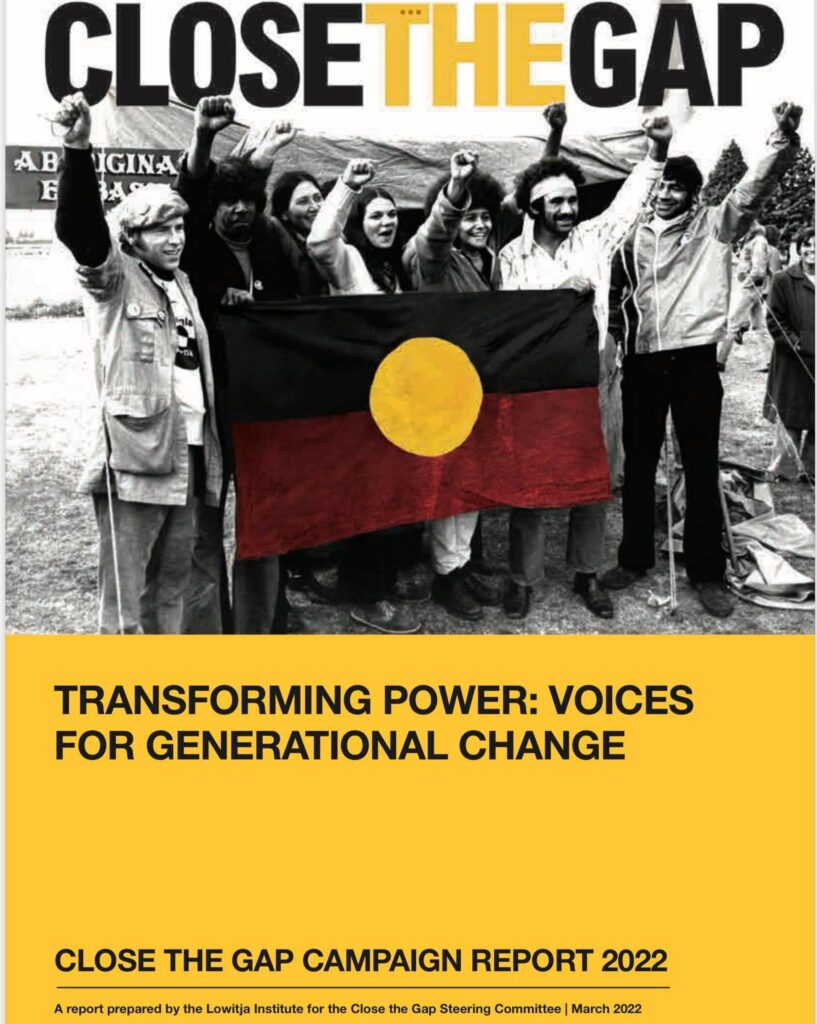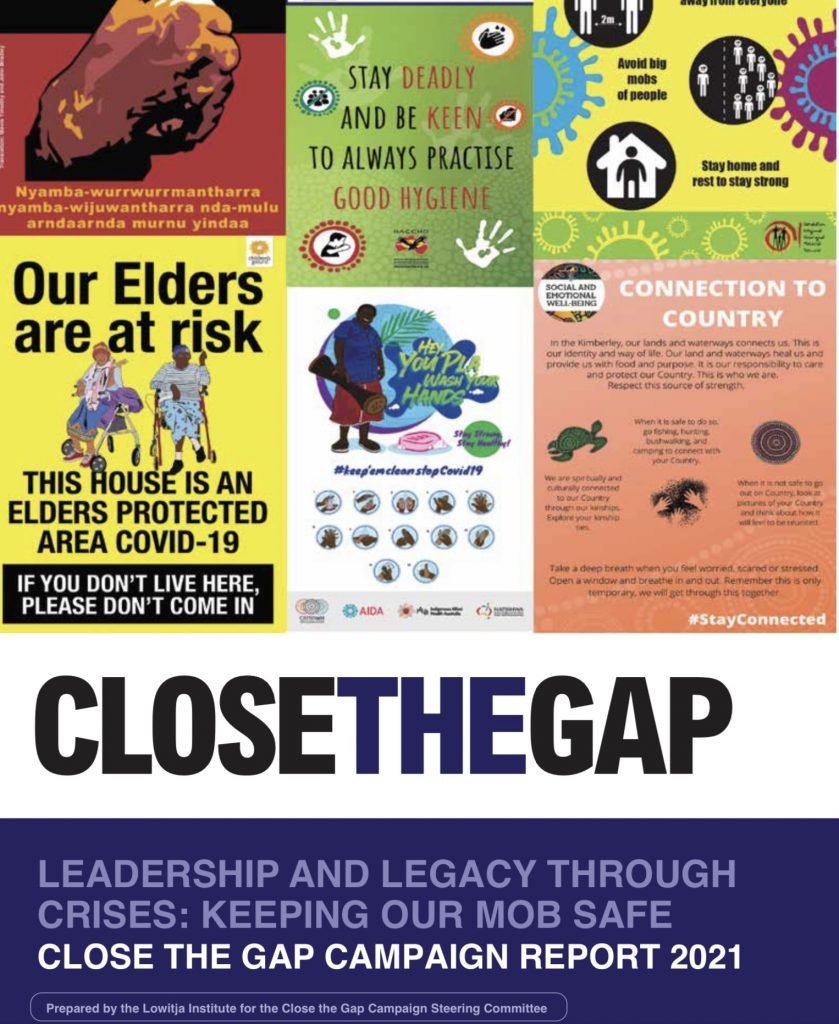Members Media
CTG Members Media
National Close the Gap Day 2023

As co-Chairs of the Close the Gap Campaign, we represent 52 First Nations and mainstream organisations who—since 2006—have come together as allies to advocate for greater investment and changed ways of working to enable Aboriginal and Torres Strait Islander health equity and equality to become a reality.
Since then, 16 years have passed. Political and policy instability prevented the Closing the Gap targets from being met and our leaders called for reform. We have always advocated that that systemic change is necessary, if we as a nation, were going to create genuine health equity and equality for our peoples.
In response to the continued health and socio-economic disparities between Indigenous and non-indigenous Australians, the federal government developed the New National Partnership Agreement. This Agreement acknowledges the central role that Aboriginal and Torres Strait Islander leadership must play if we, as a nation, are serious about addressing health equity and equality for all Australians.
On all the metrics that matter, education, justice, climate change and the social and cultural determinants of health – to name a few – there is no overarching mechanism, framework or holistic policy initiative that advocates for our specific rights and needs Aboriginal and Torres Strait Islander peoples.
We have numerous strategies at the federal and state level, decade’s worth of reports, and generations of Aboriginal and Torres Strait Islander leadership – but since colonisation, we as Aboriginal and Torres Strait Islander peoples have not had the national and structural reforms that we know are necessary for the cultural, political, social, and emotional wellbeing of our communities.
We rely on the goodwill of the Government of the Day and the unwavering strength, tenacity, determination, and oftentimes-exhausting effort of our leaders to advocate for our communities.
But more than that, we ask our youth, our up-and-coming leaders to work the same political and policy environments to drive the change they know is necessary for our peoples’. For some of our youth, they have lived in a political and policy environment where Close the Gap and the Closing the Gap Strategy have always existed. For others it came into existence when they were on the cusp of adulthood.
When we started this journey – the future generations we were trying to change the world for – are now teens heading into young adulthood.
Today, those same children, those same youth use their voice to call for the same changes this Campaign called for 16 years ago. They know, just as we did when this Campaign started, that our future- their future – must be forged through strength, leadership and cultural revitalisation.
Not content to sit back, they have followed in the steps of those before them. They call out injustice, they drive reform and always, they give back to our communities.
They are the pride of their families and the hope for our future, not just for Aboriginal and Torres Strait Islander people but for our entire nation. Their work, is not just a cultural obligation to country, community and culture, it’s the pathway to a better nation for all of us. Our ancestors paved the way and our youth build on that legacy.
Today, as we release our 14th report, we are proud and honoured to shine a light on Aboriginal and Torres Strait Islander youth who have dedicated their time and energy to create the kind of society that moves our nation forward.
It is our hope that our youth will read this report, see themselves reflected in this work and know that their dreams, their visions and hopes for their future is being paved right now.
That across this country, we see you. We see your drive, determination and care of and for community and culture; and we take refuge knowing that our future is in your hands and your future is bright.
March 2023
National Close the Gap Campaign – Co-Chairs
June Oscar AO – Aboriginal and Torres Strait Islander Social Justice Commissioner – Australian Human Rights Commission
Karl Briscoe – CEO – National Association of Aboriginal and Torres Strait Islander Health Workers and Practitioners
See the full report: Click here
A Voice to Parliament
In May 2022, when the Albanese Labor government was elected, the first commitment they made was to establish a constitutionally enshrined Aboriginal and Torres Strait Islander Voice to Parliament. Since then, every state and territory government has indicated their support for this national reform, which is to be decided by referendum later this year. If successful, it would be the first step in implementing the Uluru Statement from the Heart.
Aboriginal and Torres Strait Islander peoples and their allies know the important role that the Voice can play in creating a holistic pathway to genuine systemic reform, and a new way of working with Aboriginal and Torres Strait Islander communities. It will do this by providing Parliament and government with independent advice, based on the wishes of Aboriginal and Torres Strait Islander peoples, that is ‘empowering, community led, inclusive, respectful, culturally informed and gender balanced, and include youth’.
The Voice will also work alongside existing organisations and traditional structures, which is why the key recommendations in this report also call for the full implementation of
- Uluru Statement for the Heart
- United Nations Declaration on the Rights of Indigenous Peoples
and call for the accelerated action and implementation of:
- National Agreement on Closing the Gap
- National Aboriginal and Torres Strait Islander Health Plan 2021–2031.
Each of these frameworks recognises the intersectional nature of disadvantage that Aboriginal and Torres Strait Islander people experience. Without the holistic focus that these frameworks call for, the ability of policy, programs, and services to appreciate and respond to the needs of Aboriginal and Torres Strait Islander peoples – who sit at the intersection of other disadvantaged identity markers – are obscured. This undermines Aboriginal and Torres Strait Islander peoples’ agency and, as a result, mitigates the efficacy of policies meant to support them.
This lack of genuine holistic reform is evident, and it is impeding the success of meeting the Closing the Gap targets. This failure manifests in Aboriginal and Torres Strait Islander peoples being over-represented in the justice system, having disproportionately higher suicide and child removal rates, lower life expectancy and poorer employment outcomes. It is, in measurable terms, seen in the lack of health equity and equality for Aboriginal and Torres Strait Islander peoples across the nation.
This is the ‘torment of our powerlessness’ that Aboriginal and Torres Strait Islander leaders spoke of in the Uluru Statement from the Heart. While the details of a Representative Voice to Parliament are yet to be outlined, this is what we do know:
- Aboriginal and Torres Strait Islander peoples’ lived experiences in this country manifest issues that are specific to them as former colonial subjects.
- The key to Aboriginal and Torres Strait Islander peoples’ social, cultural, political and economic advancement is the full realisation of their rights as self-determining peoples.
- The primary factor that stipulates how much Aboriginal and Torres Strait Islander peoples and communities can exercise their right to self-determination on a national scale is whether they have a voice, at the highest level of government, to represent them and to advocate for their priorities and aspirations.
As a nation, we find ourselves at a moment in history where we can create the transformative change that Aboriginal and Torres Strait Islander peoples and communities have been calling for. We have, right now, the opportunity to build a national framework that creates the type of large-scale structural reform that is necessary if we are to Close the Gap.
A constitutionally enshrined Voice cannot, and will not, be the only answer, but it would be a significant step in advancing the rights and aspirations of Aboriginal and Torres Strait Islander peoples. As Commissioner Oscar notes:
“There are, as always, a few voices rallying against progressive propositions. But the tussle between most, is not so much about where we are heading or what we are wanting the future state to be – most of us want less suffering and struggle, an end to discrimination, and guaranteed fairness and equality. The dissent is about what should be done in policy and law and institutional arrangements to form these conditions. It is about the road we construct to take us there, and the practical steps for how change should take effect”.
A nationally enshrined Voice in the Constitution is but one of those institutional arrangements to achieve those practical steps. Aboriginal and Torres Strait Islander peoples and the broader Australian public will have differing views and ideas on how to achieve the changes needed.
As such, it is imperative that in discussing what the ‘Yes’ vote might mean, we collectively drive the national conversation in an open, healthy dialogue.
We do not need to agree on everything, that is not necessary nor likely, but we must find common ground so we can move forward and deliver real and practical change.
March 2023
National Close the Gap Campaign – Co-Chairs
June Oscar AO – Aboriginal and Torres Strait Islander Social Justice Commissioner – Australian Human Rights Commission
Karl Briscoe – CEO – National Association of Aboriginal and Torres Strait Islander Health Workers and Practitioners
Lowitja Press Release 2022

MEDIA RELEASE: 17 March 2022
Lowitja Institute CEO Adjunct Professor Janine Mohamed said the Close the Gap Campaign Report 2022 – Transforming Power: Voices for Generational Change is a blueprint for that transformation.
“The report is a beautiful and powerful call to action, showcasing Aboriginal and Torres Strait Islander-led brilliance at work, in all sorts of settings, paving the way ahead as we have done as peoples over millennia,” Adjunct Professor Mohamed said.
“It puts a spotlight on our community-led organisations and services that work tirelessly to provide equitable health care for Aboriginal and Torres Strait Islander peoples in Australia. Now it’s time for governments and mainstream services to step up, and step back, if we are to truly close the gap in health outcomes for our peoples.”
Launched today on Close the Gap Day, this year’s report highlights how Aboriginal and Torres Strait Islander peoples are leading the way in transforming health and community services, policies and programs, with foundations of culture and Country at the centre.
Produced by the Lowitja Institute, the report showcases the strength of Aboriginal-led decision-making despite unprecedented health challenges from the ongoing COVID-19 pandemic.
It focuses on themes of Aboriginal and Torres Strait Islander-led transformation, gender justice and equity, and allyship – highlighting the need for trust and accountability in partnerships to enable transformative change.
Among its key recommendations are calls for action on gender and climate justice, a national housing framework, and full implementation of the Uluru Statement from the Heart.
“We need transformation of minds to have transformation of systems,” said June Oscar AO, Aboriginal and Torres Strait Islander Social Justice Commissioner, and Co-Chair for the Close the Gap Campaign Steering Committee.
“It’s time to recognise a need for large-scale systemic reform and a paradigm shift in policy design and delivery if we want to improve outcomes in health and wellbeing for Aboriginal and Torres Strait Islander peoples,” said Close the Gap Campaign Steering Committee Co-Chair and NAATSIHWP CEO, Karl Briscoe.
For more information or to arrange an interview, please contact Jo Cackett on communications@lowitja.org.au / 0474 727 506
See the full report: Click here
Lowitja Press Release 2021

The 12th annual Close the Gap report — Leadership and Legacy Through Crises: Keeping our Mob safe — is a wake up call to Australian governments that Aboriginal and Torres Strait Islander people have the solutions to health inequity in our grasp. Lowitja Institute CEO Dr Janine Mohamed said this year’s report showcases the outstanding leadership of Aboriginal and Torres Strait Islander people through critical health crises in 2020, particularly the coronavirus pandemic, the devastating 2019-20 bushfires and the ongoing mental health emergency facing First Nations people.
Prepared by Lowitja Institute for the Closing the Gap Campaign Steering Committee, the report was released today to mark National Close the Gap Day. Available at Lowitja.org.au/CloseTheGap
“There is no more a glowing example of our leadership than our COVID-19 rates where the number of cases among Aboriginal and Torres Strait Islander people is six times lower than the rest of Australia,” Dr Mohamed said.
“Some of our homelands — only recently threatened with closure by governments — were among the safest places in Australia,” she said.
“That is an outstanding result, not just nationally but globally where so many Indigenous communities have been devastated by the virus.
Dr Mohamed said 2020 showed that strong health outcomes can be achieved for Aboriginal and Torres Strait Islander people through strengths-based community-led action — when there is matching and continued political will to support it.
“I hope this leads to more trust and commitment to work with us,” she said.
But the past year of crises have also highlighted ongoing inequities that continue to impact on Aboriginal and Torres Strait Islander health and wellbeing.
They include housing overcrowding and food insecurity, over-incarceration of young people and women in particular, an inequitably distributed and stretched health workforce, racism in health and emergency responses, and failure to act on the Uluru Statement from the Heart, climate and to protect sacred sites.
“The Black Lives Matter movement has put the spotlight globally on systemic racial injustices and we have also seen the growing toll of the climate crisis, amid the ongoing aftermath of the 2019-20 bushfires.”
Lowitja Institute urges Australian Governments to embrace and act on the recommendations of the 2021 Close the Gap report and to acknowledge that Aboriginal and Torres Strait Islander people have the answers.
“We must be allowed to lead, and we will only ever travel at the speed of trust,” Dr Mohamed said.
“Governments are not the solution, we as Aboriginal and Torres Strait Islander peoples are the solutions to governments,” she said.
Download a full PDF version of the media release HERE

We invite members of the public, schools and organisations to support the Close the gap campaign and or donate.

